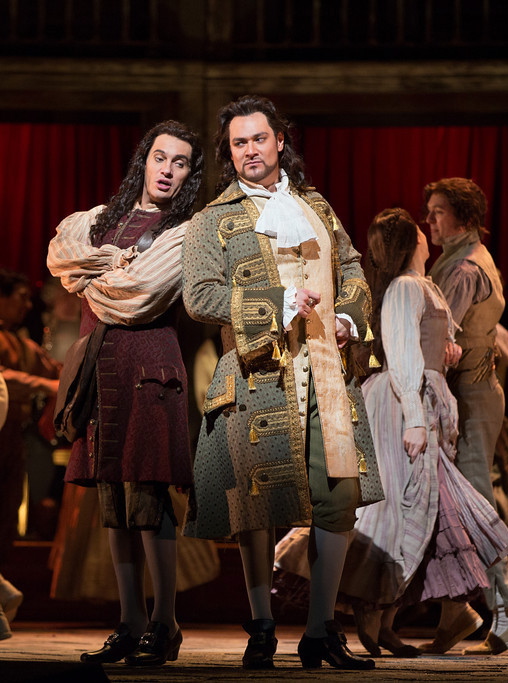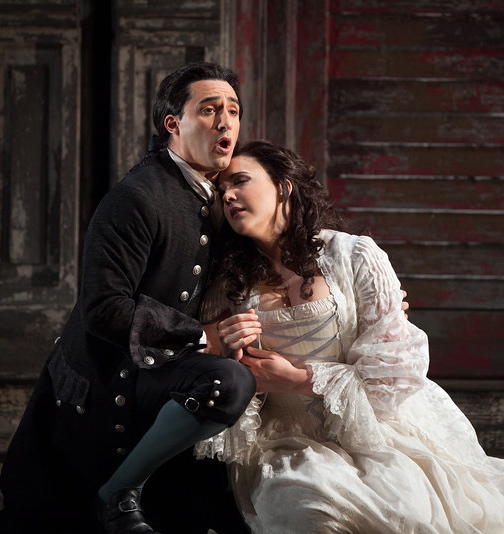A first-rate cast triumphs in Met’s “Don Giovanni”

Erwin Schrott as Leporello and Ildar Abdrazakov in the title role of Mozart’s “Don Giovanni” at the Metropolitan Opera. Photo: Marty Sohl
At some point in the mid-1800s, the legendary diva Pauline Viardot-García obtained Mozart’s autograph score of Don Giovanni. According to a recent history of opera, she commissioned a reliquary for it and invited visitors (including Tchaikovsky) to kneel in its presence.
For all the veneration it rightly inspires among musicians and audiences, Don Giovanni has had a checkered history on stage, proving as tricky to get “just right” as its leading man is slippery and ambiguous. When it bowed in 2011, Michael Grandage’s Metropolitan Opera production was both fussy and vague. Midway through, for no discernible reason, Don Giovanni lost the use of a leg, prompting concern for the health of the singer portraying him and all manner of tortured histrionics. Last night the show returned to the house much improved, largely intact but streamlined by the stage director Louisa Miller, and with a worthy cast and conductor.
Charles Castronovo of Queens made a star turn of Don Ottavio. Donna Anna’s fiancé is often portrayed as a drip, but the tall, dashing tenor looked marvelous, moved with aristocratic grace, and sang like a dream. His Dalla sua pace was a thing soulful and rapt, the reprise of the main melody couched in a velvety pianissimo, and he unfurled the long phrases in Il mio tesoro with panache and determination. The stuff of Castronovo’s dark voice is not the last word in opulence, but like Juan Diego Flórez or the late Alfredo Kraus, he bewitches with suave, musicianly singing. If audiences are lucky, he will follow their example and build his career with care. (The casting gods clearly smile upon the Met when it comes to Don Ottavio, because last season Ramón Vargas also sang the role divinely.)
Castronovo might have stolen the show without a bold, charismatic Don Giovanni. In the event, the Met had a winning duo in Ildar Abdrazakov as the dissolute nobleman and Erwin Schrott as his servant Leporello. Similar in stature, both endowed with firm, ebony voices, they pulled off their characters’ swapped identities credibly, and their marked physical resemblance made the abusive relationship of master to flunky all the more unsettling. Schrott’s tendency to mug undermined his substantial strengths, including rare nimbleness on stage and an alert, intelligent way with words. He sang well and mimicked Abdrazakov’s faintly Slavic, sagging vowels with flair when wooing Donna Elvira in the guise of Don Giovanni.
As for Abdrazakov, it was hard to believe that someone who only months ago had so powerfully portrayed the austere Dosifei in Mussorgsky’s Khovanshchina would be able to summon the oily, predatory charm needed for Mozart and Lorenzo Da Ponte’s young cavaliere. But Abdrazakov did just that, a tribute to his talent and steady, admirable artistic growth. With gestures large and small Abdrazakov conveyed Don Giovanni’s depravity. He sneered as he called Leporello a marrano. (The word, meaning “swine,” was a term of derision used against Spanish Jews.) At his last debauched banquet, he lifted two girls at once, their tiny, delicate bodies indicating that they were among the “young beginners” in whom Don Giovanni took particular pleasure. He scaled down his voice beguilingly for Deh, vieni alla finestra and nailed the blistering patter of Finch’han dal vino. While not yet a great Don Giovanni, Abdrazakov is a very good one, more than holding his own in a strong company.

Charles Castronovo as Don Ottavio and Susanna Phillips as Donna Anna in “Don Giovanni.” Photo: Marty Sohl
I have never heard a more involved and involving performance of the long accompanied recitative before Or sai chi l’onore than that given by Susanna Phillips Wednesday night. Many sopranos scramble through it to get to their big aria; Phillips understood that it is key to Donna Anna’s opera seria gravity and sang it accordingly, with passion and imagination. With a bright, somewhat girlish sound and a fluent technique, Phillips needs only a touch more bite in her delivery of the text to command this great role. She had real chemistry with Castronovo’s Don Ottavio and for once played Donna Anna as a woman violated and sincere in her quest for revenge.
Ekaterina Siurina was delectable in every way as Zerlina. She, too, sidestepped the modern clichés that make her character a conniving minx instead of a flawed but good-hearted country girl. Her voice only really bloomed in the highest reaches of the role, but she seemed genuinely torn in Là ci darem la mano and brought sweetness and warmth to Vedrai, carino.
David Soar made an impressive Met debut as Masetto, his voice attractive and even in all registers and his enunciation excellent. Emma Bell as Donna Elvira sang best in the second act. Her voice seemed unsuited to the peaks and valleys of Donna Elvira’s faux-antique music but took on a satiny, glamorous sheen in the seduction trio with Don Giovanni and Leporello. One unsteady phrase in the final scene aside, Raymond Aceto as the Commendatore sang well.
Edward Gardner’s conducting, on the slow side, emphasized dramma over giocoso but also elucidated the many disquieting inner voices in Mozart’s orchestrations. The stage bands under Jeffrey Goldberg played splendidly, the dancers executed Ben Wright’s boisterous choreography beautifully, and the real and very spectacular flames in the final scene won an enthusiastic but startled ovation.
Christopher Oram’s costumes in a rich but dusty palette and tall unit set are handsome. This Don Giovanni unfolds largely against the worn façade of a building, its strong verticals telling of social hierarchies, its cookie-cutter balconies suggesting both the numbing sameness of Don Giovanni’s catalogued conquests and theatre boxes overlooking the space where the protean nobleman performs. In truth, it is not radically different from the Met’s previous Don Giovanni production by Marthe Keller. But this revival keeps the audience’s attention where it belongs, on the chaos unleashed by Don Giovanni and his pursuers, and reminds us again of the divine and inexhaustible richness of Mozart and Da Ponte’s great opera.
Don Giovanni runs through December 20. metoperafamily.org; 212-362-6000.
Posted Nov 29, 2012 at 2:22 pm by Brian
Were we at the same performance? Unspeakably dull staging, no strong relationships, stock acting, the most predictable and tired ideas. If this had been done 40 years ago it still would have been seen as a safe and uninspired production.
Abdrazakov was magnificent vocally tho not terribly dynamic dramatically. Schrott did as you said…mugged and pranced about with meaningless attention grabbing gestures and sang in his typically inconsistent fashion. The women assailed themselves nicely. Castronovo sounded like Kermit the Frog much of the time as he tried to beef up a modest lyric sound, tho he did make some nice musical choices. But no heart to it.
All in all an uneven and disappointing remount, with some vocal highlights. The Met should do better. I’m shocked they decided to bring back the director for their new Figaro. One only hopes he will try *something*, *anything* more bold than this snooze fest.
Posted Nov 29, 2012 at 2:48 pm by Juancho
I listened to it in my computer, in Montevideo, Uruguay. A great proud to have “our” Erwin Schrott singing on that stage. Congrats!